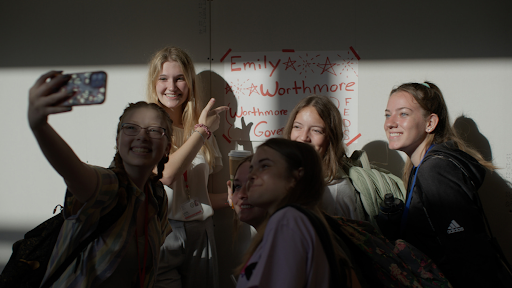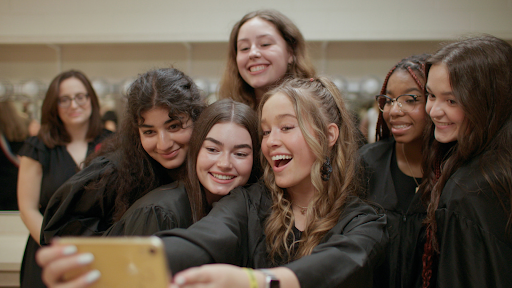In the opening scene of GIRLS STATE, a powerful monologue sets a striking tone, declaring that women are strong in their femininity and don’t have to be like men to be considered powerful. This introduction is more than a declaration: it’s a thematic cornerstone defining the essence of what Amanda McBaine and Jesse Moss’s film seeks to explore, and perhaps challenge. Paralleling 2020’s BOYS STATE, GIRLS STATE takes us to Missouri’s Girls State program, held concurrently with Boys State on the same campus for the first time in 80 years. MGRM editor Kevin Cookman penned a compelling review of BOYS STATE several years ago (which I also named my favorite film of that year). Now, GIRLS STATE mirrors its predecessor’s insightful dive into youth politics and illuminates the stark contrasts between how young men and women navigate these waters, shaped by a society of deep-rooted sexism riddled with double standards.
GIRLS STATE intricately follows the lives of several ambitious young women as they simulate a structured government environment. Among them are Emily Worthmore, a self-proclaimed conservative who comes in with big dreams of being either the President of the United States, a broadcast journalist, or a rock star; Cecilia Bartin, the fiery progressive whose staunch advocacy for gender equality drives her gubernatorial campaign; and Nisha Murali, a shy, yet astute, competitor for the Supreme Court, showcasing diversity of thought and background. Tochi, a first-generation Nigerian-American, and Faith, a reformed alt-right supporter, further personify these participants’ transformative journeys, influenced heavily by their interactions within this microcosmic political sphere.
Each woman in this cast is exemplary, and they are far from cookie-cutter. Even when their approach to politics differs from that of their counterparts, each woman genuinely listens to what their peers say and does so with poise and grace. And yet, I feel that the “poise and grace” for these women acts as a cage. These are intelligent women here to discuss the real social issues facing not just the whole nation, but their own rights and personhood, and yet most of their conversations seem to center around “female solidarity” amidst a looming cloud of the men across the campus. Even when not seen, the presence of men is a shadow across their experience. The women can’t help but compare their experience to what their male counterparts might be discussing, whether they are tackling “the real issues,” and if Boys State even thinks about what Girls State is doing (spoiler alert: they aren’t).

The juxtaposition of scenes between men and women in this documentary is poignant. On one side of the campus, the girls are encouraged by their superiors to “turn to each other and give a compliment” and “straighten each other’s crowns.” They sing songs about unity and kindness in bright, joyful tones. On the other side of the campus, boys engage in primal yells and heated debates, running across campus with their shirts off, flexing in front of the girls as they walk by. While the climate of BOYS STATE gives me vibes akin to GLENGARRY GLEN ROSS, GIRLS STATE portrays the Elle Woods-ification of the legal and political sphere, where every girl is held to a higher standard of decorum so that they can prove there is strength in their femininity.
I’m reminded of a lyric from the song “I’d Rather Be Me” in MEAN GIRLS: THE MUSICAL (stay with me here, I know this movie is not good…): “We’re supposed to all be ladies, and be nurturing and care. Is that really fair? Boys get to fight. We have to share.” These girls aren’t blind to the inequities; they immediately see through the bullshit, and they challenge it directly when they’re asked to follow a strict dress code and are shut down anytime they question why they have to follow a certain process if Boys State is not asked to do the same. Let’s not start on the later realizations about funding discrepancies between the programs, when conservative Emily—of all people—decides to expose the truth independently in a mock newspaper piece that is edited to shreds by the program’s authority figures.
A standout moment is Cecilia’s gubernatorial speech, which oozes with the charisma and flow of a rapper performing at Coachella (my spouse turned to me during this scene and said, “I was expecting her to break out into ‘Lose Yourself’”), but with the power of America Ferrera’s BARBIE monologue. It’s a rousing speech that leads her to victory, which drives Cecillia to break from the stifling competition, do the worm, and run around the room surrounded by her peers cheering her on. But amid that joyous moment, we immediately jump to a quiet room of mostly white men sitting through a heated debate, staring directly into the camera. This felt almost like a jumpscare in a horror movie and a stark reminder that for every victory a woman chooses to celebrate, there is a room full of men scheming to possibly undo the whole thing.

The reminder is even starker at the very end when a card is thrown up on the screen that only days after filming for GIRLS STATE concluded, Roe v. Wade was overturned in the Supreme Court. The impact of this ruling on the participants reveals a raw, emotional reality that these young leaders must navigate. At this point, I had a visceral reaction—not just a single tear, but an explosion of tears streaming down my face as my partner held me tight as I wailed the same words over and over again: “It’s never going to change. It’s always going to be like this. It’s never going to change.”
I wanted to leave GIRLS STATE feeling hopeful. I wanted to wave my “the future is female” flag high and proud. Instead, I was left with a mixed bag of both profound despair and admiration for the tenacity of these capable, intelligent young women. Will any of them be in positions of great political power one day? I don’t know. All I know is that even among my cynicism, I see the faces of the girls I want to keep fighting for. So, while BOYS STATE presented a chilling game of political maneuvering, GIRLS STATE offered a narrative of resilience. If BOYS STATE was a horror story, GIRLS STATE is a love story.
















Comments